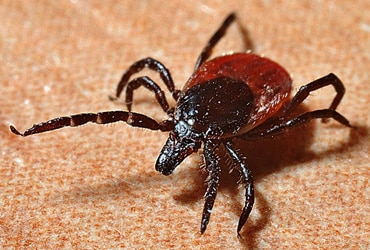Call now: (424)278-4325, or CONTACT US by email
Office Hours : Mon-Fri 8am - 6pm, Sat 8am - 12pm

If you’re suffering from Lyme disease, or think you may be, Vitality Integrative Medicine has the tools to help you on the road to health. Comprehensive testing helps identify the infection, as well as any co-infections and other imbalances caused by the disease that need to be addressed for you to feel good again. This includes looking at your hormonal, immune, and gastrointestinal systems, and toxicities. Innovative treatment methods may include IV therapies (both nutritive and ‘bug killing’ IV’s), ozone, addressing diet and lifestyle, hormone replacement, herbal medicines, and – if needed – antibiotics – as needed to address the specific deficits as they present in your individual condition. No-one will present exactly the same and thus everyone who walks into the clinic is addressed as an individual. We create a customized treatment plan specific to the way the disease has affected YOU.
It has been challenging to recognize symptoms of Lyme disease, in part because they can be so extensive thus mimicking other diseases. The illness usually begins like a flu, with or without a bull’s-eye expanding red rash referred to as erythema migrans. There is often muscle pain, joint pain and swelling, depression, brain fog and other forms of mental dysfunction, extreme fatigue, shooting nerve pains, headaches, and chest pain, to name some of the more common symptoms.
Lyme disease can be an extremely debilitating condition, affecting everything from muscles and joints to brain and even heart function. If you suspect you may have recently been infected because of recent symptom onset or you’ve been bitten by a tick, don’t delay getting testing/treatment, since the earlier you treat Lyme disease, the less are your chances of developing a chronic infection.
Classically Lyme disease was initially thought to be a short-lived infection, one that resolves easily with a course of antibiotics. However, there is now a large body of evidence proving that Lyme disease also exists as a long-lived chronic disease – evidence which is backed by positive PCR testing and positive specimen cultures. Some individuals who have received antibiotics for Lyme disease may not clear the infection. This may be because a. they waited too long to start the antibiotics, or b. the bacteria was able to use various methods to resist the antibiotics. These people then may go on to have chronic symptoms typical of Lyme disease.
It’s caused by the bacteria Borrelia (there are multiple species of Borrelia known to cause Lyme), which enters the blood via a tick bite and then travels through the body, multiplies, and sets up residence. If you have ever had a tick bite and suffer from chronic debilitating disease, it’s worth considering whether Lyme may be part of the equation. Ticks are usually found in wooded or grassy areas, and although not all ticks carry the bacteria that causes Lyme, there have been documented cases in areas not previously thought to be affected. Although the disease was originally discovered in Lyme, Connecticut, ticks infected with Lyme have been found across the country, including in California, Washington and Oregon.
When you are infected with the bacterium Borrelia burgdorferi from a tick bite, you are able to be diagnosed with Lyme disease. Standard cases of Lyme disease are traditionally treated with oral antibiotics that you must take for at least 2-4 weeks, depending on the severity of your symptoms. However, some patients can develop chronic symptoms such as fatigue, cognitive difficulties, and joint pain that lasts for more than six months after their antibiotic treatments have finished. This is called PTLDS (Post-treatment Lyme Disease Syndrome).
The medical community is unsure about why some Lyme disease patients develop PTLDS. Some have theorized that infection with the Borrelia burgdorferi bacteria leads to an autoimmune response, which causes symptoms to linger after the infection has been cleared. Lyme disease is not the only infection that may trigger autoimmune reactions. Campylobacter infections (which may lead Guillain-Barré syndrome), Chlamydia, SARS-CoV-2, and strep throat are other examples of diseases that can cause continued or new symptoms after the original infection has cleared.
Other experts believe that PTLDS happens when the patient has a persistent infection that is difficult to identify. Or some hypothesize that PTLDS symptoms result from other issues the patient has that are unrelated or secondary to Borrelia burgdorferi infection.
Unfortunately, there are no commonly accepted conventional medical treatments for this condition. Short-term antibiotic therapy can help when Lyme disease is caught early, and some patients may have benefit and need for longer term antibiotic treatments. In addition, addressing the underlying dysfunctions identified on an individual basis is key to successful treatment. This may include use of natural supplements, IV therapies such as ozone, ultraviolet blood irradiation and intravenous nutrients, as well as a variety of medications.
Thankfully, patients who have PTLDS typically improve with time. But it could take months, a year, or even longer for them to feel 100% better, and many patients do not improve at all or worsen. If you have received treatment for Lyme disease but still feel sick or you feel like there’s something wrong, contact us at Vitality Integrative Medicine. We can offer additional solutions and alternative treatment options for promoting healing and managing symptoms.
Additionally, contact us if you’re wondering about long-term antibiotic treatment for your symptoms linked to Lyme disease. After evaluating you, we can explain the benefits and possible risks of antibiotics, and consider whether this would be a good option in your case, in addition to addressing the other treatment options that may benefit you.

Call now: (424)278-4325, or CONTACT US by email
Office Hours : Mon-Fri 8am - 6pm, Sat 8am - 12pm
To schedule an appointment with Dr. Fischer,